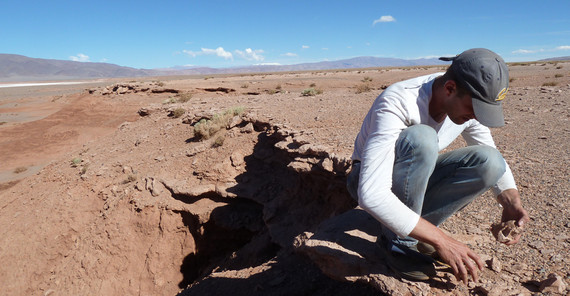April 3 was the big day: Those universities that wanted to apply for a cluster of excellence within the framework of the Excellence Initiative of the Federal State and the State Governments had to submit their 25-page outlines to the German Research Foundation (DFG). One such application was submitted by the University of Potsdam, which focuses on the interactions of geo-, bio-, and climate sciences as well as new approaches to analyzing highly complex data sets. Matthias Zimmermann talked to Bodo Bookhagen, who is the spokesperson of the initiative and Professor of Geological Remote Sensing at the University of Potsdam.
Professor Bookhagen, the cluster of excellence you applied for is called “Delta-Earth” and is about “Dynamics on the Earth's Surface”. What does that mean?
We want to understand how the earth's surface – our habitat – is being changed by events such as earthquakes, floods, forest fires, and related processes. The geologic and biologic disciplines have long investigated these events independently. But this no longer suffices. Research has to be as complex as the processes themselves, so geologists, biologists, and climatologists have joined forces.
How did the idea to apply for a cluster come about?
The application is ultimately based on research and discussions from the past 10 years. When analyzing and interpreting data sets as well as doing fieldwork, it is becoming increasingly clear that we need a multidisciplinary approach to understand what is happening on the earth's surface. Manfred Strecker, Helmut Elsenbeer, and I then wrote a three-to-four-page draft and discussed our ideas with some colleagues from other disciplines and partner institutions. We always knew that we were working on similar things, but it turns out that we also think the same way. The group grew and eventually began meeting weekly. This was a year and a half ago. We have since rewritten the initial draft a hundred times – and it has become a real joint project.
How do you do this?
By communicating. For such an application, everyone is important – yet it only works if we focus on a common goal. Keeping the threads together is as important as formulating scientific questions.
What motivated you to submit an application?
Even if it may sound like a cliché, it was primarily the thirst for knowledge. Just discussing the application takes us a step further. A successful application would enable us to establish something unique in Potsdam. A cluster would both bundle competencies and attract excellent students, PhD students, and postdocs to Potsdam who would otherwise go to MIT or ETH Zurich. It would establish a research network benefitting Potsdam for years to come.
Have you ever wanted to be far away while writing?
Of course. There are moments when you face major obstacles and wonder whether the time investment will ultimately pay off. And then I talk with colleagues, see the big picture, how important this research is and that it will be worthwhile regardless.
What will you do if you are successful?
[laughs] Then we’ll be happy – and will start working on the full application.
And if not…?
We will look for other ways to get our research off the ground – albeit in a smaller group.
Why would the Cluster of Excellence be so important for Potsdam and Brandenburg?
A cluster is good for the visibility of these scientific fields. Potsdam would become a lighthouse in terrestrial earth and biosciences, especially in connection with data science. An important component is also the transfer of knowledge to society: There would be new, interdisciplinary courses of study and my colleagues in education would ensure that the research is integrated into the curricula. The great thing about Potsdam is that a lot has happened here since I started my studies in 1995. And the structures are still flexible enough to make a difference.
Text: Matthias Zimmermann
Translation: Susanne Voigt
Published online by: Agnetha Lang
Contact for the online editorial office: onlineredaktionuuni-potsdampde

